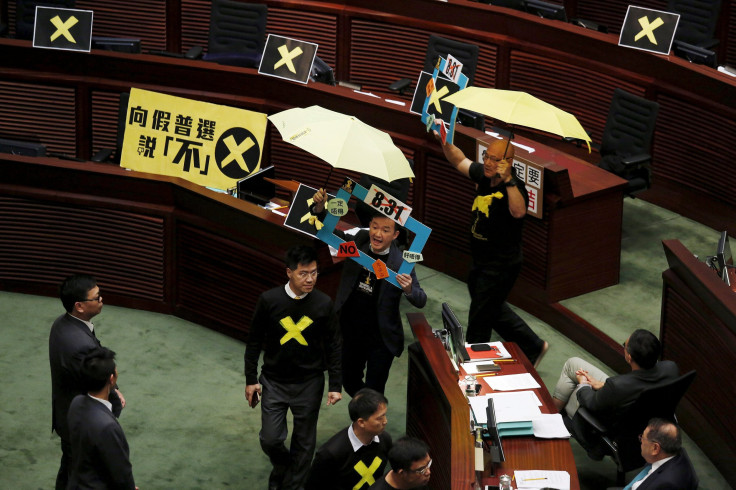Hong Kong Political Reform: Is 'Chinese Democracy' The Best The Region Can Get?

HONG KONG -- Eighteen years after China took back control of this former British colony, promising to deliver “orderly progress” toward democracy for the people living here, few would use such words to describe what has been unfolding. Last week, a procession of pro-democracy lawmakers walked out of the city’s parliament in disgust, protesting the government’s plans to reform the process by which the next chief executive will be chosen -- a reform many have derided as a sham that will cement Beijing’s domination.
Under the plan outlined by the government of the special administrative region, Hong Kong citizens would get to vote directly for the chief executive in 2017, but with one crucial catch: a body stacked with Beijing loyalists would have sole control over which candidates appear on the ballot.
“The current system is abominable,” said Emily Lau, chairwoman of Hong Kong’s Democratic Party, the largest faction in the bloc known as pan-democrats, which has enough votes to veto the plan in the city’s Legislative Council (LegCo). “But it [would be] even worse for us to give our blessing for a package that is blatantly not democracy. By voting for it, it means that we are endorsing the government’s interpretation that it is democracy, it is universal suffrage. It would be terrible,” Lau said.
The pan-democrat bloc holds 27 out of 70 LegCo seats. The government requires 47 votes to pass the reform package, meaning it will have to convince four pan-democrats to switch sides for the proposal to become law. It is not a prospect that appears likely.
Lau’s views were echoed by other members of the pan-democrat camp with whom International Business Times spoke this week.
Frederick Fung, a pan-democrat and member of the Hong Kong Association for Democracy and People’s Livelihood, said the bloc members feared that if they accepted the package, “There will not be any further change. ... We would have to live with it our whole lives ... and we can’t accept that.”
Further hardening the pan-democrats’ position is the fear of electoral punishment. After some members of the camp cut a deal with the government to support a constitutional reform package in 2010, the bloc lost 40 percent of its seats in district council elections the following year.
The other significant party in the debate -- the Beijing government, rather than the Hong Kong administration -- appears to be adopting a similarly entrenched position, with senior Communist Party officials saying in recent days Beijing will not make any concessions over Hong Kong’s electoral reform that deviate from its own principles.
The result of the package’s rejection would be the continuation of the existing system, where a nominating committee effectively appoints the chief executive, and the continuation of dysfunctional government in one of Asia’s key financial centers, which experts says is a losing proposition for all parties.
“It does not bode well,” said David Zweig, director of the Center on China’s Transnational Relations at the Hong Kong University of Science and Technology. “Beijing’s strategy in doing this is to try and stabilize Hong Kong, and that’s one of the reasons they want to have universal suffrage. They believe that the chief executive will be more legitimate and better able to govern.”
However, Zweig said, “My concern is that the next Chief Executive will have no legitimacy, even less than if it were through some kind of electoral process.”
Other analysts offered guarded support of the proposed reforms, indicating that if pan-democrats do not take the deal currently on offer, that could be the end of the political-reform process in the region.
“Even though the package is quite conservative, it is worth getting through, because if we lose this opportunity, we really don’t know when we will have the next round of negotiations with the central authorities,” said James Sung, a political analyst and lecturer at the City University Hong Kong.
Opportunities to negotiate a compromise that would allow Hong Kong to continue its democratic development in a manner acceptable to Beijing seem slim.
The central government’s recent track record of entering into substantive negotiations with Hong Kong pro-democracy factions does not suggest a compromise is likely. Last year, pan-democratic legislators took part in a series of meetings with mainland officials that they understood to be informal negotiations on political reform. They were subsequently stunned when the standing committee of China’s National People’s Congress handed down a framework governing political reform in the region that was seen as offering no concessions to pro-democracy supporters.
This led to the Occupy Central demonstrations paralyzing parts of the city for months late last year. Despite one round of talks between the government and protesters, again no concessions were made, and the protests eventually fizzled out.
Whether a deal is possible remains to be seen, but, for now, the only certainty on the region’s political horizon is division -- and a perilous path toward further democratic liberalization.
© Copyright IBTimes 2024. All rights reserved.






















